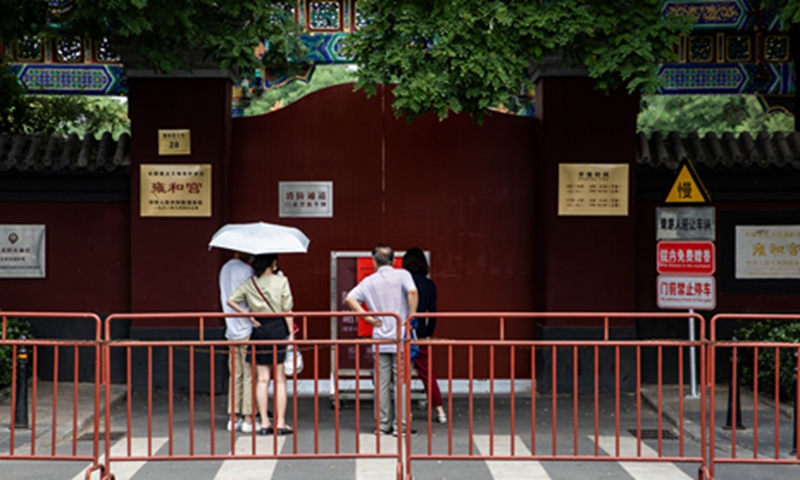More Beijing cultural sites close once again due to new COVID-19 cases
By Ji Yuqiao Source:Global Times Published: 2020/6/17 17:53:40

Beijing residents stand out of the gate of the Yonghe Lama Temple. Photo: IC
More cultural venues in Beijing, including various museums, announced they were closing again or postponing their reopening after the capital raised its COVID-19 emergency response from Level III to Level II due to a recent outbreak in the southern and western part of the city. Meanwhile, those that are not shutting down have begun implementing stricter measures to limit visitor traffic.
On Friday, prior to the raising of the emergency response status, some museums and scenic spots, such as the Yonghe Lama Temple had already begun announcing closures and instructing visitors to get refunds for tickets due to the outbreak at the Xinfadi market, a major wholesale food market in Beijing.
The Yonghe Lama Temple officially closed on Saturday, just three days after reopening.
"All religious activities and places in the temple will be suspended starting Saturday. For those who have booked tickets, please seek refunds online," the notice published on its official website said.
"I had planned to visit the Yonghe Lama Temple during the Dragon Boat Festival holiday, but now my plans are likely ruined," a Beijing resident surnamed Liu, 27, told the Global Times on Wednesday. In addition to the Yonghe Lama Temple, the shutdown of the National Centre for the Performing Arts has also frustrated Liu, who is a fan of musicals.
"The COVID-19 epidemic has ruined many of my plans and is depriving me of my hobbies," she said.
About 20 museums in Beijing have closed again or suspended their reopening. The city's museums were granted permission to open on May 1 and by early June,and a third of them had reopened, according to a report from Sohu News.
Some museums that have decided to keep their doors open despite the outbreak began to focus on increased measures to protect visitors instead.
The National Museum and the Palace Museum, two of the most significant museums in Beijing, are currently planning to stay open, but with stricter measures. For instance, The Palace Museum reduced the visitor volume from 8,000 daily to 2,000 on Monday, according to a report from the Beijing Business Daily.
Keeping fit
The impact of the new outbreak hasn't been limited to cultural sites.
Some fitness centers in Beijing, especially those in basement locations were informed that they must close. An employee of a fitness chain store in Beijing's Chaoyang district told the Global Times that one branch store at a basement closed after receiving a notice from the government.
"We had planned to reopen on Thursday. All facilities in our branch locations have been disinfected for many times to conform to sanitary standards, but the return of the virus has made all our efforts in vain," the employee said.
He noted that the above-ground branches have not been affected, so members who normally go to underground locations will still be able to have a place to exercise.
The new cluster of COVID-19 cases in Beijing has also been a major blow to cinemas already hard-hit by the months-long shutdown and in urgent need of reopening.
Most cinema owners are at the end of their tethers. Facing bankruptcy, many have sold their homes to maintain cash flow, and some have started to sell products online or deliver food to pay rent and employee salaries.
Be it ordinary Beijing residents or workers in the capital's various cultural industries, everyone the Global Times talked to is looking forward to the day the virus can be defeated once and for all.
RELATED ARTICLES: